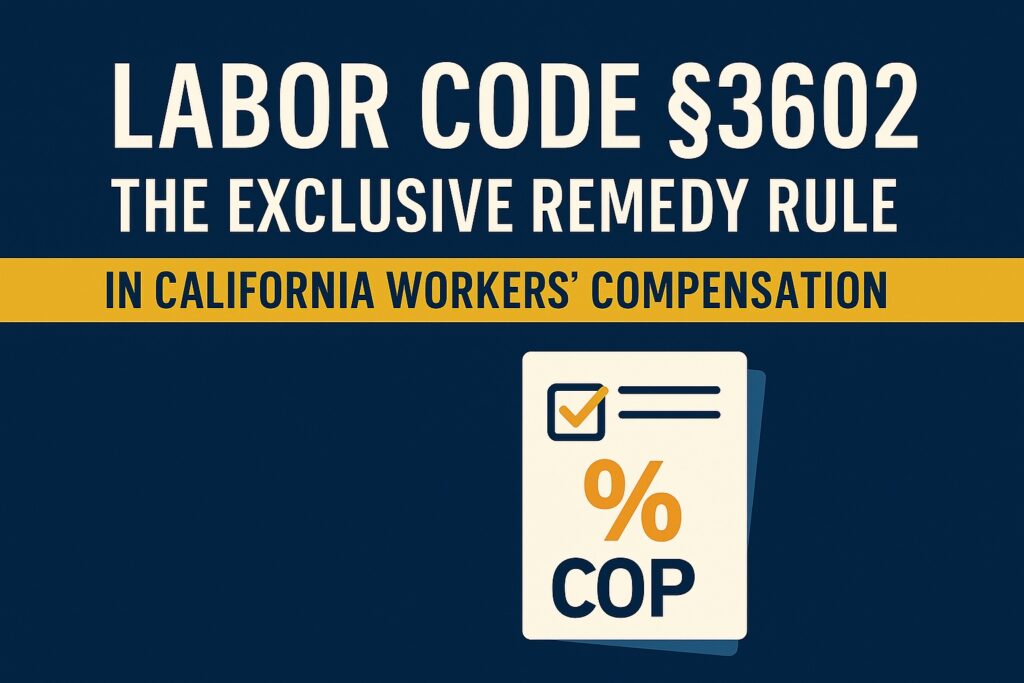
What Is the Exclusive Remedy Rule?
California Labor Code §3602 sets out the “exclusive remedy rule”—a foundational principle of the state’s workers’ compensation system. It means that if you’re injured on the job, you generally cannot sue your employer in civil court for damages. Instead, workers’ comp is your sole legal remedy.
The idea behind this rule is a trade-off: workers don’t need to prove employer fault to receive benefits, but in return, employers are shielded from civil lawsuits—even if they were negligent.
However, like many legal rules, there are exceptions—and understanding them can have a major impact on your rights and recovery.
Text of Labor Code §3602
“(a) Where the conditions of compensation set forth in Section 3600 concur, the right to recover compensation is, except as specifically provided in this section, the sole and exclusive remedy of the employee or his or her dependents against the employer…”
“(b) An employee…may bring an action at law for damages against the employer…where the employee’s injury or death is proximately caused by a willful physical assault by the employer, or where the employee’s injury is aggravated by a knowing concealment of the existence of the injury and its connection with the employment…”
What This Means for Injured Workers
In most situations, when you’re hurt at work, your only legal option is to file a workers’ compensation claim. That includes:
- Slip and falls at work
- Equipment malfunctions
- Repetitive stress injuries
- Car accidents during work duties (with exceptions)
You cannot sue your employer for pain and suffering, emotional distress, or punitive damages in these cases.
Exceptions to the Exclusive Remedy Rule
There are a few important exceptions where workers can pursue a civil lawsuit against their employer, including:
- Willful assault by the employer or a managing agent
- Fraudulent concealment of the injury and its cause
- Lack of workers’ compensation insurance
- Serious and willful misconduct (triggering enhanced comp benefits under LC §4553, not a civil suit—but still worth noting)
Each of these scenarios requires specific legal analysis and strong evidence. At Employees First Labor Law, we investigate these exceptions aggressively in serious cases.
What About Third-Party Lawsuits?
Labor Code §3602 only limits your rights against your employer—you may still be able to sue third parties who contributed to your injury, such as:
- Equipment manufacturers (defective products)
- Contractors or subcontractors on a job site
- Property owners (unsafe premises)
These third-party lawsuits can provide damages that workers’ comp doesn’t cover—like pain and suffering, full lost wages, or punitive damages.
How EFLL Protects Injured Workers
At Employees First Labor Law, we:
- Ensure clients get every dollar of workers’ comp benefits
- Explore exceptions to §3602 to determine if civil remedies apply
- Coordinate third-party civil lawsuits with trusted co-counsel
- Pursue Serious & Willful Misconduct claims when appropriate
We know how devastating it can be to hear, “You can’t sue.” That’s why we explore every possible path to full justice for our clients.
Final Thoughts
Labor Code §3602 makes workers’ compensation your “exclusive remedy”—but it’s not always the end of the road. Understanding when exceptions apply can unlock significant additional recovery.
Learn more here
👉 🔝 Top 25 California Labor Codes for Workers’ Compensation (2025 Guide)
How EFLL Can Help
If your injury is being challenged or you are experiencing issues with the workers compensation system, Employees First Labor Law can help. We’ll make sure your injury is recognized and your claim is taken seriously.



